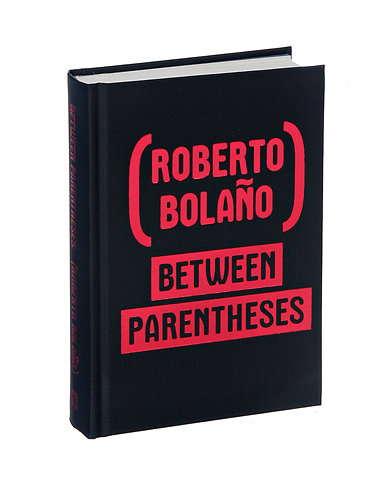This collection of non-fiction pieces is a treasure-trove for anyone who has read Bolaño’s fiction and who came away smitten by the author’s vibrant, mercurial, poetic voice.
Some elements of Bolaño’s novels and stories — their settings, aspects of their storylines, their narrators or chief protagonists, and their spirit of inquiry — are grounded in autobiography. This is especially true of the novels, “The Savage Detectives” and “Antwerp.” Bolaño’s friend and literary executor, Ignacio Echevarria, who has assembled the 125 pieces found in “Between Parentheses,” addresses this subject in his helpful Introduction to the book: “This volume amounts to something like a personal cartography of Roberto Bolano and comes closest, of everything he wrote, to being a kind of fragmented ‘autobiography’.”
Stated more broadly, there was, for Bolaño, no bright line between fiction and non-fiction.
What this means is that seasoned readers of this author will comfortably enter and enjoy the world of these essays, speeches, newspaper columns, travel articles, and other occasional pieces. If the reader perceives anything different it is that here the voice they have come to expect — opinionated (“plagiarists deserve to be hanged in the public square”), argumentative (a writer friend praises John Irving, but this is “an enthusiasm that I don’t share”), passionate (his love for his soon-to-be-orphaned son shines bright), and a bit of a rapscallion (“one of the best ways to steal . . . I had learned from an Edgar Allen Poe story”) — is even closer to the essence of “I, Roberto Bolano.”
In a piece from 1999, the autodidact Bolaño declares: “I’m much happier reading than writing.” His admiration is clear whenever he’s able to mention that this friend or that acquaintance “has read everything.” As for the scope of his own reading and interests generally, this is demonstrated by a nine-page Index that completes “Between Parentheses.” The Index contains the names of over 600 persons, including musicians, filmmakers, and artists. But mostly there are authors, among whom is a strong contingent of Americans Bolaño read with critical fervor.
These pieces were written during the period after he had been diagnosed with a fatal liver disease that in 2003 would take his life. It is no surprise, then, that a theme he returns to time and time again is the question of what constitutes a well-lived life. When describing someone’s accomplishments, for example, if he wants to impart his ultimate compliment he will write, “. . . and he was also a good man.” (George Orwell is one such man.) His critical gaze does not spare himself, his foibles and his imperfect works. In contrast, politics holds little appeal (although there are a few columns about the situation in his native Chile). When, in the final piece in the book, he is asked by an interviewer what things bore him, he answers: “The empty discourse of the Left. I take for granted the empty discourse of the Right.”
We learn that “By Night in Chile” was originally titled, “Storms of Shit.” He tells us we should consider “The Savage Detectives” to be “a response, one of many, to `Huckleberry Finn’.” At one point he declares: “Everything I’ve written is a love letter or a farewell letter to my own generation, those of us who were born in the 1950s.”
There’s his easy humor too. Attending a poetry reading, Bolaño notices the auditorium is “filled up with freaks who seemed to have just escaped from a mental asylum, which incidentally is the best audience a poet can hope for.”
His free spirit is everywhere. In speeches and essays ostensibly devoted to a specific subject, he wanders off path, pursuing diversions that lead to further diversions, which then are interrupted by a confessional revelation, or an informal bit of chat. The reader wonders, is this explained by a discovery Bolaño made as a youthful soccer player, now revealed to us — that he was “left-footed but right-handed”?
The aphoristic bent so characteristic of his fiction is on constant display: “Writers write with their hands and their eyes.” “Crime seems to be the symbol of the twentieth century.” “Literature is basically a dangerous undertaking.” “Books are the only homeland of the true writer.” He speaks of the impact of “fate — or chance, that even fiercer beast.” Every few pages a striking declaration stopped me short, such as this biographically-grounding insight capping his interpretative essay on “Huckleberry Finn”: “Twain was always prepared to die. That’s the only way to understand his humor.”
It occurs to me that it might be said that Bolaño, like the American visual artist Robert Rauschenberg, found himself most productive, most freely communicative, when operating in the gap between art and life. There’s a good chance you’ll discover, while reading “Between Parentheses,” that this interstitial volume gives as much pleasure as anything else you’ve read by this author.
About this book as physical object: It is compact but not small, feels sturdy and is comfortable to hold. The book is signature-bound, a traditional bookbinding method that has the practical effect of allowing the opened book to stay flat for your perusal, rather than springing shut. (Your hands don’t have to fight this book; it will likely survive use without warping.) The impression I come away with is that the editor and publisher meant for it to become a permanent addition to your library — a plan Bolaño, who was covetous of his personal collection of books, surely would be pleased with. There is no dust jacket, however. Using the same design approach it applied to “Antwerp,” the publisher, New Directions, has chosen to emboss the title, author, translator (the consistently excellent Natasha Wimmer), and other information on the front and back covers, this time using a striking, iridescent raspberry color on a black ground. In addition to the helpful Index, the editor has supplied an 11-page Sources section, with explanatory notes (Bolaño had filed copies of most of the original texts on his computer).
.
An alternative version of this review appears on Amazon, here.

